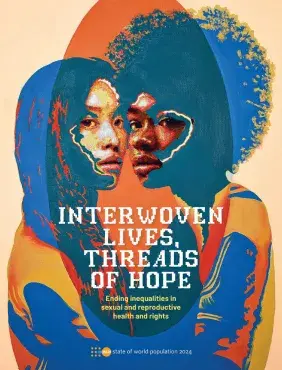UNFPA's State of World Population Report 2024, Interwoven Lives, Threads of Hope: Ending inequalities in sexual and reproductive health and rights, highlights the role racism, sexism and other forms of discrimination continue to play in blocking broad gains in sexual and reproductive health for women and girls. The data are damning. Women and girls who are poor, belong to ethnic, racial and indigenous minority groups, or are trapped in conflict settings, are more likely to die because they lack access to timely health care.
“In the space of a generation, we have reduced the unintended pregnancy rate by nearly one fifth, lowered the maternal death rate by one third, and secured laws against domestic violence in more than 160 countries,” says Executive Director Dr. Natalia Kanem. “Despite this progress, inequalities within our societies and health systems are widening, and we have not adequately prioritized reaching those furthest behind. Our work is incomplete but not impossible with sustained investment and global solidarity.”


